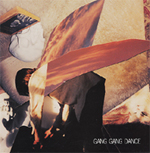|
|
 |
Dusted Reviews
Artist: Gang Gang Dance Album: Gang Gang Dance Label: Fusetron Review date: Nov. 22, 2004 |

|
|
|
 |
In John Zorn’s COBRA, improvisers respond to cues from a director, changing the style and content of their playing accordingly. At its best, the game works like a schizophrenic delaying of gratification; in time, the players learn to use the breaks as opportunities rather than obstacles. The sounds and rhythms on Gang Gang Dance’s eponymous LP, recently reissued on CD, are in constant flux; John Zorn has been replaced by a shaman dishing out junkyard electronics and synthesizers. Liz Bougatsos’ shrill voice flutters across the record, falling in and out of rhythms, presiding as much as accompanying. Rhythmically, industrial march is the norm – a weird convolution of krautrock tendencies and the grit of Throbbing Gristle – but those rhythms rarely last long before they are deconstructed, tossed aside into a bed of distortion and dirty sine tones, then picked up again piece by piece.
Gang Gang Dance has become a fixture in New York recently, and for good reason. While their music has evidence of form and content by consensus, the line between composition and improvisation is often invisible, as it should be. The result is sometimes unsettling – the band shifts direction seamlessly and frequently as if by cue or psychic connection, though much of this is owing to the collage aesthetic of the recording itself.
While the band shares some sonic territory with fellow travelers and sometimes touring buddies Black Dice and Animal Collective, Gang Gang Dance is decidedly more frantic than exploratory, jettisoning the former’s penetrating soundscapes and the latter’s entrancing rhythmic guitar work. What appears to be dynamic improvisation, a willingness to risk leaving the listener without the satisfaction of coherent song structure or aural environment, at points devolves into a jumbled mess of cheap synths, delayed shrieks and drum loops.
Gang Gang Dance has, since the record’s original release and certainly since 2002, when some of its material was first recorded, changed dramatically. Live, identifiable songs have slowly replaced the emphasis on abrasive noise, powerful drones, and percussive clatter. The many sounds on GGD have been pared down, thankfully – the record contains a profusion of obvious delay effects and banal electronic tones (thank you, Nintendo) that have since been forsaken. Vocals, too, now grace their music in a more coherent, if less surprising way. Case in point: the drums and sinister synth swell on the beginning of GGD’s second side churn away, laced with breathy, squalling vocals. But any tension fails to develop, and the beat is suddenly disrupted by an overdriven fluctuating tone that dominates the next five minutes of the record. The stylized and, at times, redundant use of low-fidelity noise and sound processing is out of place at best, artless at worse.
GGD is at its best when the band locks into a groove, when those disparate sounds are cast aside in favor of permutated rhythms and sonic pantomime: synth strings resemble a zither; tom drums invoke Cambodian pop; a meandering piano is pinned by an Ethiopiques-esque bass line. The record opens with expressive soprano vocals transformed by delay pedals into a whale song, then mirrored and distorted, finally cuing rhythmic feedback tones and fragmented percussion. The most consistently impressive element of GGD is the band’s ability to sound at once familiar and utterly foreign, and to arrive at that sound from diverse points of origin.
By Alexander Provan
|







